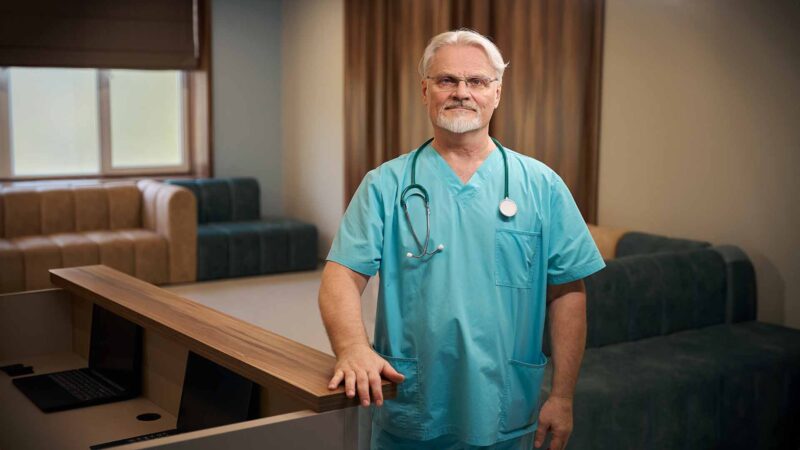Men’s urological needs refer to the medical and surgical conditions that affect the male urinary tract system and reproductive organs. Some of the common men’s urological needs include:
- Prostate health: The prostate is a gland located just below the bladder and is important for male reproductive health. Conditions such as benign prostatic hyperplasia (BPH) or prostate cancer can affect prostate health.
- Urinary tract infections (UTIs): UTIs are common in men and can cause pain and discomfort during urination. They are caused by bacterial infections in the urinary tract system.
- Erectile dysfunction: Erectile dysfunction (ED) is the inability to achieve or maintain an erection sufficient for sexual intercourse. ED can be caused by several factors such as nerve damage, psychological issues, or underlying medical conditions.
- Infertility: Infertility is the inability to conceive a child. Male infertility can be caused by several factors such as low sperm count, poor sperm motility, or genetic conditions.
- Testicular health: Testicles are important for male reproductive health. Conditions such as testicular cancer, torsion, or trauma can affect testicular health.
- Incontinence: Incontinence is the loss of bladder control and can be caused by several factors such as prostate surgery, nerve damage, or medication side effects.
- Kidney stones: Kidney stones are hard deposits that form in the kidneys and can cause pain and discomfort during urination.
- Urological cancers: Men can develop several types of urological cancers, including prostate cancer, bladder cancer, and kidney cancer.
A urologist can address these concerns, however a pharmacy-led model of care developed by Brad Butt, called Mens Health Downunder has offered an alternative to certain urological needs of the male adult population over the past 10 years.
Initially commencing in Canberra and now in 9 locations across Australia, the operation is run by a group of Australian pharmacists that provide rehabilitation solutions and cost-effective endorsed medical grade treatments for men with urological health issues. Mens Health Downunder provides products that are medical grade and specifically tailored for individuals with urological or sexual health issues backed by evidence-based solutions and pharmaceutical advice.
Mens Health Downunder exists to address the growing need for men to access quality health advice, break the stigma around urological health and reduce the embarrassment so men openly ask questions and confidently address health concerns. No concern is off limits.
Australian Health Journal met with Brad to hear about his journey, Mens Health Downunder and the impact the pharmacy-led model of care has had on patient’s urological as well as mental health.
Brad’s mission is to also raise awareness for prostate cancer. Prostate cancer is now the most common cancer diagnosed in Australia with expectations of aggressive diagnosis to double by 2028, overtaking breast cancer. Interestingly, media tends to focus on breast cancer more than prostate cancer. Often this is because of the stigma associated with prostate cancer. Men suffer in silence and are less likely to seek medical diagnosis and treatment. However, the stigma that surrounds prostate cancer and men’s health is a significant barrier that is being addressed, by Brad and his team of pharmacists.
You Might also like
-
Strong primary care nursing solutions for a healthier Australia
The CEO of Australian Primary Health Care Nurses Association (APNA), Ken Griffin spoke with Australian Health Journal about the following:
– APNA President Karen Booth representing Primary Care Nursing in the Australian Government led Strengthening Medicare Task Force
– The current key challenges in primary care nursing
– Programs on diversity and student placement proposed in APNA’s pre-budget submission to Federal Government
– A proposed initiative called Nurse-Supported Self-Care, with broadening role primary care nursing would play in the community
– Hopes for other health priorities addressed in the Federal BudgetIn the lead up to the Australian Federal Budget in May 2023, Australian Health Journal reached out to peak health industry bodies to hear about their priorities, either noted in pre-budget submissions lodged with Federal Government in January 2023 or in recent forums such as the Strengthening Medicare Taskforce.
-
State of private healthcare in Australia
Australia’s healthcare system is often described as a mixed system, with a combination of public and private providers. While public healthcare through Medicare provides universal coverage for essential services, private healthcare offers additional options and amenities for those who can afford them.
Private Healthcare Australia (PHA) is the Australian private health insurance industry’s peak representative body that currently has 21registered health funds throughout Australia and collectively represents 98% of people covered by private health insurance. PHA member funds today provide healthcare benefits for over 14 million Australians.
-
Medical research institutes association responds to draft national research strategy
On 27 August 2025, the Minister for Health, Disability and Ageing announced the release of the draft National Health and Medical Research Strategy (the National Strategy).
Involved in the initial consultation phase, was the Association of Australian Medical Research Institutes (AAMRI), the peak body for medical research institutes across Australia. Member institutes work on a broad spectrum of human health issues such as preventive health, chronic disease, mental health, immunology and Indigenous health. Their research ranges from fundamental biomedical discovery through to clinical research and the translation of research findings.



